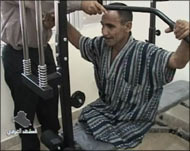Iraqi veterans fear being forgotten
Disabled Iran-Iraq war veterans have voiced great resentment at the level of neglect they have been suffering since the UN-imposed sanctions on Iraq and the subsequent occupation of the country.

At the beginning of the eight-year Iran-Iraq war in 1980 disabled veterans used to get a specially adapted car, a lump sum of $30,000, a monthly salary, medical treatment, a piece of land to build a house in addition to other privileges.
The benefits were cut back as the Iran-Iraq war dragged on amid worsening finances. When sanctions were imposed on Iraq on 6 August 1990, it brought the already aching economy to a standstill.
Disabled soldiers were left with only a meagre monthly salary and limited medical treatment.
Their exact number is unknown as the Iraqi government never provided any official statistics, but Iraqi officials put the figure in the tens of thousands.
Veterans speak out
Aljazeera visited one of the residential compounds built by Saddam Hussein’s government in 1989 to house the families of 135 soldiers, disabled while fighting in the Iran-Iraq war.
Residents of al-Thura compound showed great disappointment at the situation they now find themselves in.
Kawsaj Mahmud complained of poor medical attention and says he and his family are living in isolation, cut off from the outside world.
 |
|
Iraqi disabled war veteran |
“The medical centre is poorly managed; whenever we go, there is no doctor on duty. And there is an obvious shortage of medical equipment,” he said.
“I can’t drive; in an emergency it is a real problem for me, I have to move with my wheelchair to the main street to get a car. Frankly speaking it has become more scary for me. I used to do it reluctantly but at least I was feeling safe; now I’ve even lost that feeling as I force my way to the main street.”
Fadhil Kwain said the former government did not give them ownership of the flats they occupy, and he is afraid that one day he will be thrown out.
“We have done our duty in defending our country. We gave everything we could, so do we not deserve a place to live in?,” he said.
“We have nothing to prove our ownership of the flats here; any government official can tell us to get out at a moment’s notice.”
Social consequences
Abu Kadhim, a father of 11 who lost all four limbs in the 1980-1988 war, also expressed concern about the lack of proper medical treatment.
“I am concerned like the other disabled veterans about not owning the flats we are living in now.
“It has become very difficult for us to get the medical equipment and attention we need like the wheelchairs and physiotherapy.
“We have approached several officials in the new government, but have so far failed to get any promise to solve our problem, all we hear from them is that these type of things are postponed until further notice, neither them nor we know when that further notice will be” Abu Kadhim said.
Abu Kadhim’s wife, Um Kadhim, said they are dependent on her brothers because her husband’s salary is not enough to meet their needs.
 |
|
NGOs have been unable to |
“His [Abu Kadhim] salary is very low. I always have to ask my brothers to help us financially, and that puts my husband in a very bad mood. It is difficult for a man to feel he is not up to earning enough for his family needs,” she said.
Majid Hasan, representative of the disabled in Baghdad’s municipal council, has vowed to follow up the demands of those who live in al-Thura compound and other similar compounds but he could not give guarantees.
“The demands of the handicapped are for basic needs, to own a house and get a proper salary. Their demands are nothing in comparison to what they lost in the act of defending their country,” he said.